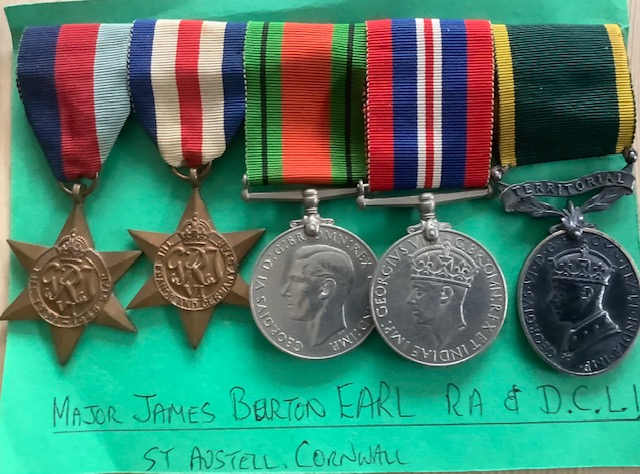Man reunited with father’s Second World War medals
A man from St Austell has been reunited with his father’s Second World War medals, thanks to a passionate medal expert at Wadebridge Antiques Centre.
Man reunited with father’s Second World War medals
A man from St Austell has been reunited with his father’s Second World War medals, thanks to a passionate medal expert at Wadebridge Antiques Centre.

David Earl, 82, was left stunned when he discovered that his father’s medals, awarded for his service during the Second World War, were still in the county.
Cornish medal expert Kev Bennett, 61, who runs Wadebridge Antiques Centre, first became interested in military history and medals when he was just a young boy living in London. A veteran of the Great War, known to his family, offered to take Kev to the Imperial War Museum, sparking a new passion that he would take with him through life.
“The lollypop man came round and asked my mother if he could take me to the Imperial War Museum,” Kev said. “He was a veteran of the Great War, and that’s what started it all for me. I’ve been collecting medals since I was 15, and have around 2,500 medal groups in my collection.”
When a new group of medals came into Kev’s possession from a dealer in Wales, awarded to a soldier of the Royal Artillery of the Duke of Cornwall’s Light Infantry during the Second World War, he put them on Facebook with an intention to sell them on. With more than forty years of experience in the medal collecting field, Kev had his reservations about selling them, and felt protective over the medals.

“I put them on Facebook for sale, but said they have to remain in Cornwall,” he said. “Soon after, I received a message from someone, who said he knew his son. I told him I wouldn’t sell the medals to anyone, took the post down and, sure enough, I received a phone call from David Earl, who said, ‘I think you have my dad’s medals’.”
David’s father, Major James Burton Earl, landed in Normandy shortly after 6th June 1944 - better known as D-Day.
David gave Wadebridge Life some insight into his father’s time during the war: “He was called up to serve in the last war, and went into the Royal Artillery. He was posted to Cornwall to man the artillery and munitions and, while he was in the army, he met my mother, Beryl Pope. She was born here and her father ran a very well-known business, Stephens and Pope, which was a wholesale grocer in St Austell.
“At some point, Dad was commissioned as a captain, and ended up in General Montgomery’s staff. In the days after D-Day, he was driving a Jeep across the beach as the Allies continued through France. After the war, he joined the DCLI (Duke of Cornwall’s Light Infantry) and served for several years. When he left the army, he became a manager at Stephens and Pope, where he was best known as ‘Jimmy’.”
Kev made the connection when he saw David’s father’s name on a 12 year Territorial Efficiency Medal, awarded to veterans who have served a minimum of 12 years in the Territorial Force. David made the trip over to Wadebridge, where he met Kev and was able to view the medals in person.
Kev said: “We just gave them back to him. It was as though the people of Wadebridge were giving the medals back to the family, where they belong.”
David said: “It was a friend of mine through the Rotary, who found out about the group of medals, who told me that I should get in touch with Kev. I’m in the process of framing the medals now. It was a very happy occasion, on all fronts.”

Kev has spent 45 years collecting medals and militaria, and has a particular interest in the Great War (1914-1918). There are some fascinating items in his collection, available to view at Wadebridge Antiques Centre, that offer a glimpse into the lives of the soldiers who fought during the early part of the twentieth century, from medals and shell cases, to a phone system used to communicate in the trenches.
One group of medals that means a lot to Kev was awarded to a 17-year-old boy killed during the Battle of the Somme in 1916, which Kev has since researched. He said: “This boy was about fifteen or sixteen when he signed up. During the battle, the men heard someone crying out for help; somebody had been injured and was caught up in barbed wire. This boy went out to help him, and was killed. I have his medals and his letters that he wrote to his sister.
“In my opinion, he was worthy of a VC (Victoria Cross) or a DC (Distinguished Conduct). I’d never sell them. To me, he’s a hero.”
It is these stories that encourage Kev to collect and research the veterans whose medals and items come into his possession. With no surviving veterans of the Great War left - the ‘Last Fighting Tommy’ being Harry Patch, who served in the DCLI and died in 2009 - and with the number of Second World War veterans living today on the decline, it’s more important than ever to encourage people to connect with stories of the past.






_web.jpg)


.jpg)




